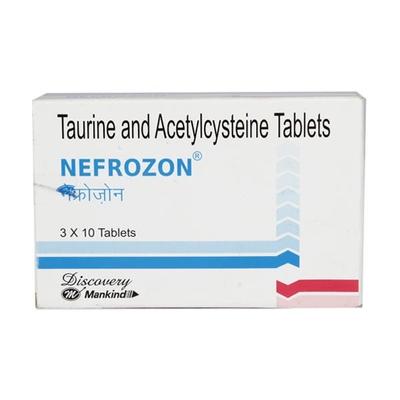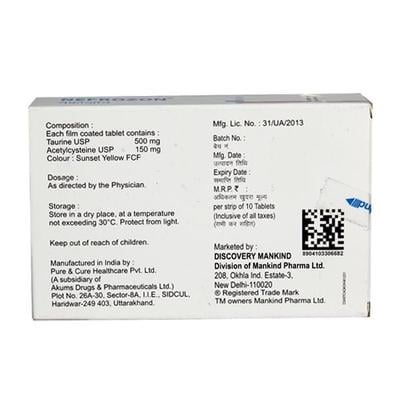

Netmeds First Membership
Quick Links
Introduction About NEFROZON TABLET
NEFROZON TABLET is a combination of N-Acetylcysteine and Taurine, which belongs to the group of medicines called Renoprotectives and Amino acids. It is used to manage diabetic kidney disease, paracetamol poisoning, and radiocontrast induced kidney damage.
It protects the kidneys from damage and reduces the risk of kidney failure. Diabetic kidney disease is caused by diabetes or an increase in blood sugar, which leads to damage to the kidney.
Before taking NEFROZON TABLET, inform your doctor if you have lung or kidney problems, atopy (problem with your immune system that makes you more likely to develop allergic diseases), acute flushing, or erythema.
NEFROZON TABLET is not recommended for use in pregnant and breast-feeding women unless clearly advised by the doctor. The most common side effects of taking NEFROZON TABLET are nausea, vomiting, flushing, rash, and mouth sores. Consult your doctor if any of the side effects worsen.
Uses Of NEFROZON TABLET
To manage:
- Diabetic kidney disease
- Paracetamol poisoning
- Radiocontrast-induced kidney damage
How NEFROZON TABLET Works
NEFROZON TABLET works by slowing down the process of damage to the kidney cells and accordingly improving kidney functioning. It also helps in managing the disintegration of some microalbuminuria in diabetic kidney infections. In Paracetamol poisoning it manages the deterioration of microalbuminuria and enhances the non-toxic sulfate conjugation of paracetamol.
How to use NEFROZON TABLET
Take NEFROZON TABLET as advised by your physician. Swallow NEFROZON TABLET with a glass of water. Do not crush or chew the medicine. Your doctor will decide the correct dose and duration for you depending on your age, body weight, and disease condition.
Side Effects Of NEFROZON TABLET
Common
- nausea, vomiting
- rash, fever
- mouth sores, runny nose
- edema
- flushing
How To Manage Side Effects
Nausea And Vomiting
Stick to simple meals. Avoid eating oily, fried, and spicy foods. Do not perform any strenuous activities immediately after eating. Consult your doctor if the symptom does not improve.
Skin rash Or Itching
Do not scratch the affected area. Wear protective clothing while going outdoors. Regularly moisturize your skin. Consult your doctor if the symptom worsens.
Warning & Precautions
Pregnancy
Monitoring requiredNEFROZON TABLET is not recommended for use by pregnant women unless considered clearly necessary. Consult your doctor before taking it.
Breastfeeding
Monitoring requiredNEFROZON TABLET is not recommended for use by pregnant women unless considered clearly necessary. Consult your doctor before taking it.
Alcohol
Consult your doctorAvoid consuming alcohol during management with this medicine.
Kidney
Use with CautionNEFROZON TABLET should be used with caution in patients with kidney disease. Consult your doctor before taking it.
Allergy
ContraindicatedDo not take NEFROZON TABLET if you are allergic (hypersensitive) to acetylcysteine or taurine.
Lungs
ContraindicatedNEFROZON TABLET is not recommended for use in patients suffering from a severe and sudden attack of asthma. Patients with asthma will be monitored closely during management with this medicine.
Others
Before taking NEFROZON TABLET, inform your doctor if you:
- have atopy (problem with your immune system that makes you more likely to develop allergic diseases)
- have acute flushing and erythema
Interactions
A. Drug-Drug Interactions:
Before taking NEFROZON TABLET, inform your doctor if you are taking any of these medicines:
- antitussives such as dextromethorphan and levodropropizine (medicines used to manage coughs)
- oral antibiotics such as azithromycin and amoxicillin (medicines used to manage bacterial infections)
Overdosage:
If you or anyone else accidentally takes too much of NEFROZON TABLET, consult your doctor immediately or go to the nearest hospital right away.
Synopsis
| Drug | : | N-Acetylcysteine, Taurine |
| Pharmacological Category | : | Renoprotectives, Organo sulfonic acids |
| Therapeutic Indication | : |
To manage diabetic kidney disease, paracetamol poisoning, and radiocontrast-induced kidney damage |
| Dosage Forms | : | Tablet, Capsule |
More Information
- Keep the medicine out of the reach of children
- Store at room temperature
FAQs About NEFROZON TABLET
Q: What is NEFROZON TABLET used for?
A: NEFROZON TABLET contains n-Acetylcysteine and taurine, which are used to manage diabetic kidney disease, radiocontrast-induced kidney damage, and paracetamol poisoning. Consult your doctor before taking it.
Q: How does NEFROZON TABLET work?
A: NEFROZON TABLET works by slowing down the process of damage to the kidney cells and accordingly improving kidney functioning. It also helps in managing the disintegration of some microalbuminuria in diabetic kidney infections. In Paracetamol poisoning it manages the deterioration of microalbuminuria and enhances the non-toxic sulfate conjugation of paracetamol.
Q: What if I forget to take a dose of NEFROZON TABLET?
A: If you have missed a dose of NEFROZON TABLET, take it as soon as you remember. However, if it is almost time for your next dose, skip the missed dose and take the next scheduled dose. Do not double the dose to make up for the missed one.
Q: Can NEFROZON TABLET be used in patients with lung problems?
A: NEFROZON TABLET is not recommended for use in patients suffering from a severe and sudden attack of asthma. Patients with asthma will be monitored closely during management with this medicine. Consult your doctor before taking it.
Q: Can NEFROZON TABLET be used in pregnant and breast-feeding women?
A: NEFROZON TABLET is not recommended for use in pregnant and breast-feeding women unless clearly advised by the doctor. Consult your doctor before taking this medicine if you are pregnant, planning to get pregnant, or breast-feeding your child.
References
1. V. Viswanathan, M. B. Nair and P. Tilak. Effect of taurine and acetylcysteine in attenuating microalbuminuria in type 2 diabetes: Indian journal of Nephrology. NIH National Library of Medicine, National center for biotechnology information. PubMed Central. April 2008 [Accessed on 26th February 2024] https://www.ncbi.nlm.nih.gov/pmc/articles/PMC2813118/
2. Akhilesh Kumar Singh, Prabhat Agarwal and Saurabh Kaushik. Study To Compare The Therapeutic Efficacy Of N-Acetyl Cysteine And Combination Of N-Acetyl Cysteine And Taurine In Proteinuria In Diabetic Nephropathy. Asian Journal of Pharmaceutical and Clinical Research. February 2017. [Accessed on 26th February 2024] https://innovareacademics.in/journals/index.php/ajpcr/article/view/15369
3. Hospimax. Alycysta (N-Acetylcysteine and Taurine). [Accessed on 26th February 2024] http://www.hospimax.com/formulation/Alcysta%20website%20content.pdf
4. Kabir Lifesciences. ACETA-N 500 (N-Acetylcysteine & Taurine Tablets). [Accessed on 26th February 2024] https://www.kabirlifescience.com/product/aceta-n
5. Alniche Life Sciences Pvt. Ltd. Renosave Tablet (Acetyl Cysteine + Taurine). [Accessed on 26th February 2024] https://www.alniche.com/product/renosave/
Useful Diagnostic Tests
- Kidney Function Test (KFT)
- Kidney Profile (Kft) With Electrolytes
- Urinary Microalbumin
- Albumin, Serum
- Microalbumin, Urine Spot
- HbA1C, Also known as Glycated Hemoglobin, Glycosylated Hemoglobin
- Blood Glucose Fasting (FBS)
- Random Blood Sugar (Rbs)
- Post Prandial Blood Sugar (PPBS)
- Routine Diabetes Care
- Diabetes Screening
- Advance Diabetes Monitoring (Senior Male)
- Advance Diabetes Monitoring (Senior Female)
- Diabetic Profile-Advanced
- Diabetic Profile-Basic







